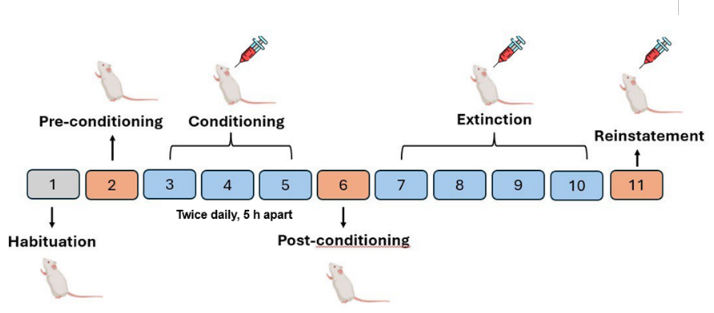Ivermectin attenuates nicotine-induced reward-like behaviors in mice
DOI:
https://doi.org/10.17305/bb.2025.13026Keywords:
Ivermectin, nicotine, CPP, emergency medicine, health burden, dependenceAbstract
Nicotine addiction poses a significant public health threat, particularly within the realm of emergency medicine, where it is associated with serious complications, including cardiovascular events and respiratory distress. The limited effectiveness of current pharmacological treatments for nicotine dependence underscores the urgent need for innovative and effective therapeutic approaches. Recent studies have shown that ivermectin, an antiparasitic agent, modulates the GABAergic, glutamatergic, and purinergic systems, which are implicated in the pathophysiology of addiction. This study aimed to examine the effects of ivermectin on the acquisition, extinction, and reinstatement of nicotine dependence in mice, utilizing the conditioned place preference (CPP) test, a widely recognized methodology in drug addiction research. Ivermectin (1 and 5 mg/kg, i.p.) was co-administered with nicotine (0.5 mg/kg, i.p.) over three consecutive days during the acquisition phase of nicotine dependence. In a separate experiment, the influence of ivermectin on the reinstatement of nicotine-induced CPP was assessed following an extinction period, using a single nicotine priming injection (0.1 mg/kg). Results indicated that ivermectin (1 and 5 mg/kg) significantly reduced the development of nicotine dependence (p < 0.05). Furthermore, ivermectin (5 mg/kg) facilitated the extinction of nicotine-induced CPP (p < 0.01) and attenuated the reinstatement of nicotine-induced CPP triggered by a priming dose of nicotine (p < 0.01). In contrast, administration of the lower dose of ivermectin (1 mg/kg) did not yield statistically significant effects on either the extinction or reinstatement phases (p > 0.05). Additionally, nicotine administration, alone or in combination with ivermectin at the tested doses, did not produce significant changes in motor coordination or locomotor activity. These findings suggest that ivermectin may attenuate both the acquisition and reinstatement of nicotine-induced CPP while facilitating the extinction of nicotine dependence. Collectively, the results indicate that ivermectin holds potential as a therapeutic agent in the treatment of nicotine addiction.
Citations
Downloads

Downloads
Additional Files
Published
Issue
Section
Categories
License
Copyright (c) 2025 Mustafa Enes Demirel, Abdurrahman Ekici, Oruç Yunusoğlu

This work is licensed under a Creative Commons Attribution 4.0 International License.









